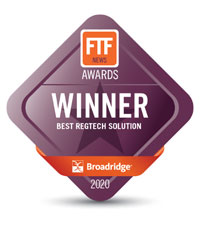Why did Broadridge win this year’s FTF News Technology Innovation Award for Best RegTech Solution?
Our regulatory reporting service provides the necessary framework to consolidate data across multiple systems, asset classes, formats, and reporting regimes, leveraging our experience globally as a provider of regulatory reporting. It includes an advanced end-user dashboard that enables efficient and comprehensive monitoring and tracking of each data element of every transaction/event from initial source through the complete lifecycle. The system gathers the necessary data from our clients’ relevant trading, customer, and reference data systems and harmonizes it into a standard data model. The engine then verifies and gathers additional data from external sources to populate a complete trade and transaction database for each client. This trade and transaction data is then compared to the rules of each jurisdiction to determine reporting needs. Where reporting is necessary, our solution formats the data so it can be sent to trade repositories and monitors responses from these agencies.
Please remind us about what Broadridge has been doing in the regulatory technology arena.
Broadridge has continued to innovate in regulatory technology and in 2017 we acquired Message Automation. Broadridge’s regulatory reporting service provides a strategic platform for event based regulatory reporting across asset classes, jurisdictions and geographies. Building on the strong base of reporting built for Dodd-Frank, EMIR, MiFID I and II, we have extended the platform to encompass new regulatory mandates in a broader set of asset classes and segments of the event lifecycle through our delivery of solutions for SFTR and CAT. Additionally, we have applied our ABCDs of innovation to regulatory reporting and deployed the platform (already cloud-ready) to AWS for CAT and CFTC reporting.

What are the biggest pain points for securities firms that must manage the cost and complexity of complying with ongoing regulatory reforms?
Firms must invest in their operations and regulatory compliance at a time when they are under fee pressures. The imperative for firms becomes how to utilize investments in technology, operations and regulatory compliance to lower costs, increase efficiencies and expand business opportunities. Overall, it means that firms must create right sized technology capabilities that scale to the needs of the business and can set the groundwork for future efficiencies and growth.
Cost savings can be made through the ability to share core services within a cloud offering. For example, sending a report to a Trade Repository may require the use of a leased line and the cost of this connectivity could be shared with other participants of a cloud offering. The cost of supporting these types of connections is also likely to be lower when split between several firms.
Have firms been able to transfer any aspects of a regulatory conversion effort to a another set of regulatory changes?
Yes, our clients have taken a more strategic approach to regulatory reporting rather than tackling each new regulation in isolation. The Broadridge platform allows them to implement the next regulation within the same technology framework.
Which kinds of regulatory technology are proving to be effective in helping with compliance?
Those that combine strong data harmonization and integration capabilities along with fit for purpose rules and validations engines. This tackles the key issues of data quality, for example, consolidating data from multiple sources to produce one type of reporting and applying regulatory rules to properly identify what and to whom events need to be reported.
Are these ongoing waves of regulatory reform permanently changing workflows for most firms? If so, which workflows are changing the most?
The way workflows are changing, is that firms need to identify how they can apply a cost-effective regulatory reporting approach across business lines and assets classes. Instead of siloing workflows by asset class, it changes to regulatory reporting processes across asset classes and business groups.
How has the pandemic lockdown affected the progress of regulatory compliance at most firms?
It has put stresses on firms meeting deadlines for regulatory changes. Also, it has added a new layer of processes around managing compliance from a work from home environment.

